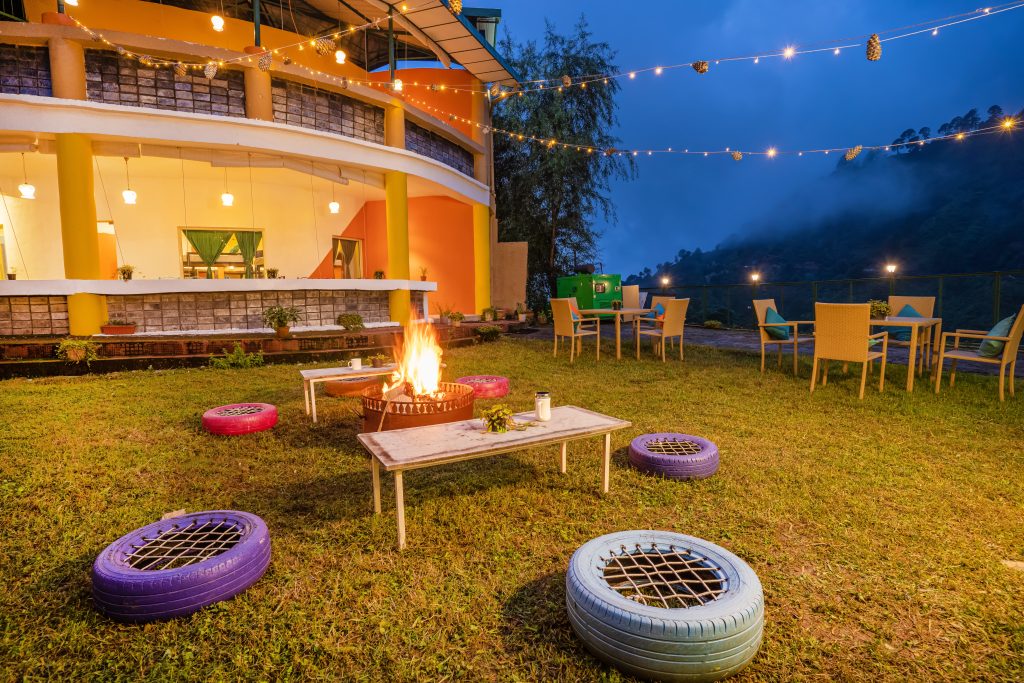Imagine, it’s one of those days when the sun has risen with its orange-tinted rays sliding in through your window and it’s time for you to get out of bed. But today, it’s different, as you find yourself in the lap of a sleepy mountain village. The soothing sounds of a river and chirping birds summon you while you sip on your tea surrounded by a vast stretch of tea gardens. You are now soaked in the amalgamation of daydreaming and a magical muse with a view too good to be true. And that’s how you relish tea in Palampur. Sounds like a chai lover’s dream, doesn’t it?
Our weary souls are always on a hunt for offbeat getaways to live out our dreams away from our busy city lives. While places like Manali and Shimla top the list for easy escapes, Palampur is in the heart of the Kangra Valley. It has managed to remain off the radar for many city folks. With Mcledoganj on one side and Bir on the other, Palampur is the tea capital of northwest India. With thriving and lush tree gardens, the mornings here are bright and evenings pleasant. The tea in Palampur is perhaps its biggest gem to show off, so read up.
Historical Roots Of Tea In Palampur
Cultivating The Seeds
Palampur has the historical distinction of being the first-ever commercial tea plantation, with history dating back to the 19th century. And this was due to William Jameson, superintendent of the Botanical Gardens at Saharanpur and the Northwest Frontier Province. In 1849, he decided to plant a few shrubs of a Chinese hybrid of tea in three spots – the town of Kangra, Bhawarna, and Nagrota, each with different altitudes.
Apart from Kangra, which proved to be too dry and warm, the shrubs took to the soil in both other locations. Encouraged by this, the local administration had set up a commercial plantation near Palampur a mere 3 years later. Within the next seven years, Palampur and the surrounding land had a whopping 19 tea estates. By the end of the 19th century, about 10,000 acres of land were covered in tea plantations, producing nearly 1,000 tonnes of tea each year.
Progress And Catastrophe
Palampur gets its name from the word ‘palum’, meaning ‘plenty of water.’ This abundance of water, coupled with the compatible climate, led to nearly 80% of the plantations being in and around Palampur. Boosted by the machinery and techniques of the British planters, the tea in Palampur gave it a spot on the world map. Kangra tea, as it is known even today, was making its way to Russia, Central Asia and Afghanistan.
Things took a turn for the worse in 1905 when a devastating earthquake hit the Kangra region. Entire valleys and villages were reduced to rubble, and the English planters left never again to return. Locals took over the estates, now abandoned, but without the reach of the British. As a result, the quality and productivity of the plantations started to decline.
Over time, the situation worsened. The government and politicians turned a blind eye, and sadly, the results of an economic survey show that the number of tea growers in Kangra has come down from 5,000 to 1,100 since 2010. The early ‘80s had around 4,000 hectares under cultivation, but that has dropped to 2,300 hectares today.
What’s The ‘Tea’ Today?
Things may seem bleak for tea in Palampur, but all is not lost! In 2006, Kangra won recognition as a “geographic indicator” for tea, similar to how Champagne in France is an indicator for wine. The estates are a popular tourist attraction, and tea production is still very much in business. Sure, we have heard a lot about tea from Assam and Darjeeling, but Palampur’s tea is no less than a tour de force of the Kangra Valley to date.
Chai & More: Things To Do In Palampur
Visit The Tea Gardens
The most beautiful part of being in this quaint town is exploring its infamous tea gardens. Strolling through the flourishing slopes of the tea garden will leave you yearning for a hot cup of tea. With their aromatic surroundings, dense green carpets and rolling hillsides, these tea gardens are a special retreat for tea lovers.
You can visit the many tea estates; some are privately owned and not open to tourism, while others are ‘demonstration plots’ managed by certain organizations. Two famous ones are the Palampur Co-Operative Tea Factory and the Bundla Tea Estate.
Try Your Hand At Pottery
A treasure trove for art connoisseurs and artistic folks, Andretta is an artsy, charming village just 20 minutes away from Palampur. This is the best place to witness the art of pottery-making at basic and minimal pricing. Two other popular places to explore here are the Shobha Singh Art Gallery and Chameli Niwas. Both of these are great for history buffs, photographers, and artists.
Visit The Tashi Jong Monastery
With a unique sense of respect, peace and virtue this monastery is an abode for Tibetan refugees. This magnificent structure offers peace and tranquillity along with stunning views of the Kangra valley.
P.S. Don’t forget to try lip-smacking Tibetan flavours from the Tibetan restaurant inside the monastery.
Seek Blessings At The Baijnath Shiva Temple
One of the most visited tourist spots in Kangra Valley, this temple is known as an architectural masterpiece. Being one of the oldest Shiva temples, it draws tourists and devotees from all over the country to offer prayers to the lords. Enclosed within lush green gardens and snow-laden mountains, the temple is sure to invoke your senses and spirituality.
Take A Serene Walk At Neugal Khad Bridge
A popular attraction for all tourists as well as locals, this rustic iron bridge offers a panoramic view of the majestic Dhauladhar range. It is an absoloute treat to the eyes an makes a great spot to get those pretty sunset shots on the colossal bridge. Apart from a picturesque setting, one can also explore a couple of cafés and eateries nearby to satisfy those evening hunger pangs.
Sit Back And Enjoy A Cup Of Chai
We don’t have to say this out loud but, when in Palampur, just sit back and relax with a cuppa chai in your hand and stunning views in the front. Kangra tea is a soothing honey colour, fragrant and light. This is the place for you to lay back for once and let go of all your stress and worries at that moment. Wake up early, sip on tea in Palampur as you watch the sunrise, and don’t forget to enjoy the humming notes of little birdies.
Conclusion

From witnessing the art of pottery-making in the Andretta village to visiting the oldest Shiva temple in Baijnath for prayers, Palampur has loads to do. But the tea in Palampur is the cherry on the cake and will sweep you off your feet. When in Palampur, make sure you check out goSTOPS Palampur. We’re in the centre of a charming little hamlet, and our rooms, each with stellar views, make for the best place to sit back and relax with a cup of hot chai.
FAQs
Why Is Palampur Famous?
Known as the tea capital of North India, Palampur is famous for its lush green tea gardens, famous temples and colonial architecture.
What Is The Best Time To Visit Palampur?
The best season to visit Palampur is the winter season and the onset of summer, from the months of September to June.
Is It Safe To Visit Palampur For A Family Vacation?
Yes, it’s absolutely safe to visit Palampur with family or friends because of its peaceful environment and friendly neighbourhood.
What Is The Best Way To Explore The Town Of Palampur?
The best way to explore the town and nearby places is by the bus. The town is well connected with HRTC buses running safely along different routes, operated by Himachal Pradesh Government.
Are There Any Popular Treks And Trails In And Around Palampur?
Yes, there are a great number of treks and trails to explore in and near Palampur for adventure enthusiasts. Some of the famous ones to try are Triund Trek, Barot and Rajgundha Valley Trek, and Bimi Devi Temple trek.


